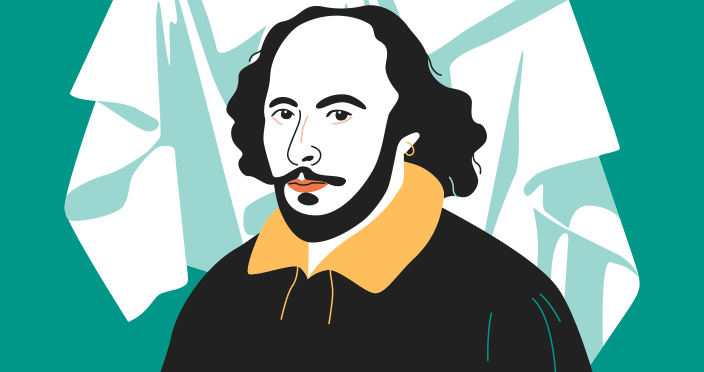William Shakespeare remains one of the most influential poets worldwide. Shakespeare’s writing style, characterized by vivid imagery, abundant soliloquies, humor, and wordplay, is still considered unique and inspiring.
However, while he was famous and prosperous enough during his lifetime, he wasn’t then recognized as the preeminent author of his era. If you want to learn more about the life, enduring impact, and writing style of William Shakespeare, just keep reading.
🕰️ William Shakespeare: Timeline
William Shakespeare’s life lacks twists and turns. Judging from what we know, he was a successful and wealthy person, with a loving family and prosperous career. Seeing his life in a timeline format can be helpful nonetheless.

🎉 William Shakespeare’s Biography
William Shakespeare’s success started in London, where he pursued the career of an actor and playwright. His popularity at the time could be explained by the reigns of Elizabeth I and James I, who enjoyed the theater and his plays. He was the favorite of both monarchs.
William Shakespeare’s works are now printed all over the world. Some of his most well-known works include Macbeth, The Merchant of Venice, Othello, Hamlet, and Romeo and Juliet.
William Shakespeare’s Childhood
Allegedly born in 1564, William was the eldest child in the family. His father was an important person in town, as he was fulfilling civic positions. His higher standing allowed him to send his children to a local grammar school. Yet, there is no record of Shakespeare having an education. This uncertainty has led to some doubts regarding the authorship of the plays.
All of his early life, Shakespear lived with his parents. When he turned 18, he married a 26-years-old Anne Hathaway. The marriage was quite rushed, as she was pregnant during the wedding.
William Shakespeare’s Career
Around the 1580s, Shakespear arrived in London. By the 1590s, he was partnered with Lord Chamberlain’s Men. It was an acting company that he was connected to for most of his career. Later, it was renamed King’s Men due to the crowning of King James I.
Shakespeare mainly was earning a living as an actor and playwright. By 1597, he had already published 15 of his plays. During his lifetime, Shakespeare became quite wealthy. He purchased a real estate property near Stratford that doubled in value and brought him profit. That allowed him to write his plays without interruptions for work. Being an entrepreneur and an artist, he purchased the second-largest house in Stratford for his family.
Shakespeare and his partners built their own theater, which was called the Globe Theatre. Unfortunately, in 1613, it was burned down after a cannon shot set fire to the roof during one of the performances. The year after, it was completely rebuilt.
William Shakespeare’s Personal Life
As we’ve mentioned above, Shakespeare married Anne Hathaway when he was eighteen. Six months after their marriage, Anne gave birth to their daughter, Susanna. She later gave birth to twins – Hanneth and Judith. However, Hanneth died at the age of 11 due to unknown causes.
William Shakespeare’s Death
It is suggested that Shakespeare died on his 52nd birthday in 1616. The exact cause of death is unknown. However, many believe he died after a brief illness of some sort. He left all of his possessions to his eldest daughter, Susanna.
📚 William Shakespeare’s Works & Legacy
Shakespeare was a respected man during the time of his career. However, scholars didn’t recognize his true genius until the 19th century. The popularity of his works reached its height. During the 20th century, his works were rediscovered once again and adopted.
Now, William Shakespeare’s books are incredibly popular. People study them at educational institutions and interpret them in plays.
William Shakespeare’s Plays
Throughout his literary career, Shakespear wrote 37 plays. Most of his first works, except for Romeo and Juliet, were historical. As a writer, he mostly portrayed the destructive results of corrupt rulers. The play that most likely resonated the most with the audience was Julius Caesar that describes the shift in Roman politics. At that time, an aging monarch, Elizabeth I, had no heir, which created a potential for political struggles.
Shakespeare also wrote comedies, such as Midsummer Night’s Dream, Merchant of Venice, and Much Ado About Nothing.
In his later period, he wrote such tragedies as Macbeth, Othello, King Lear, and Hamlet. His characters represented the qualities of humans that are timeless.
Shakespeare’s Hamlet might be the most popular one of his plays. The story tells about a prince who wants to avenge his father’s death but gets entangled in philosophical issues he can’t solve. Why did Shakespeare write Hamlet? There is no specific reason. It was the product of Reformation – a religious revolution where Protestants broke from the Catholic Church. So, what heavily influenced Hamlet, if not humanism and religion.
Finally, Shakespeare wrote several tragicomedies and other plays. Some of them are Cymbeline, The Tempest, and Coriolanus.
William Shakespeare’s Poems
Among other accomplishments of the writer, there are poems. Although Shakespeare became more famous for his plays, he did write a handful of poetry in his early career. At that time, he wasn’t thought of as a poet. Serious artists who could be considered poets were highly educated people, unlike children of glove-makers.However, the poems that have survived these days show that Shakespeare was indeed a great lyrist. These are A Lover’s Complaint, Venus and Adonis, The Rape of Lucrece, and The Phoenix and the Turtle, among other incredible examples.
✒️ William Shakespeare’s Writing Style
Shakespeare’s writing style improved over the years. In his early career, he wrote conventionally. As he got more comfortable, he started using the language derived from the needs of characters. The main idea of Shakespeare’s writing style was to make his heroes talk in the natural language while being quite poetic.
The writer used a pattern consisting of unrhymed iambic pentameter, which was called blank verse. Most of Shakespeare’s contemporaries used the same pattern. The danger with blank verse was of being monotonous. That could be seen in some of the early Shakespeare plays. However, as he progressed, he mastered the iambic pentameter to the extent where he could perfectly portray human emotions. Readers can observe this pattern in Shakespeare’s writing style used in Macbeth.
He also wrote his plays in a combination of verse and prose. Shakespeare’s prose style was primarily used in soliloquies. These provide the necessary information about the plot to the reader and give scenes an emotional appeal. Take Hamlet, for example. The protagonist’s lengthy monologues help the audience understand his struggles and emotions.
Also, Shakespeare switches between verse and prose to show the difference between a careful and disordered speech. When Hamlet switched to prose, it meant that he wasn’t thinking clearly. Plus, the Prince had to pretend to be crazy most of the play. The scenes where Hamlet deliberately speaks in prose are the ones where he’s acting insane. That’s also shown in the scene where Ophelia goes mad and talks in prose.
Shakespeare used the flexibility of blank verse together with poetic devices to present different characters. For instance, in Othello, Shakespeare uses the techniques to show two polar opposites. The protagonist, Othello, speaks with round, open vowels, poetics images, which present a picture of a noble, well-educated person. The antagonist, Iago, is a hissing character. Shakespeare highlighted the “s’s” in his speech and used a lot of short words.
Shakespeare’s authorship of the plays was questioned 150 years after his death. Many scholars suggested that people of more known backgrounds were the real authors. How large was Shakespeare’s vocabulary, considering there is no evidence about his education? Could he write all the sophisticated plays without a proper educational background?
The vast majority of Shakespearean scholars argue that yes. He did exist, was a genius, and wrote all of his plays. There is evidence of contemporaries who communicated with Shakespeare as an actor and playwright. Plus, he was recognized as a member of the King’s Men.
Thanks for reading the article! We hope you’ve learned about William Shakespeare everything you were interested in. You can check our study guides on his Hamlet and Othello for more information about the plays.
